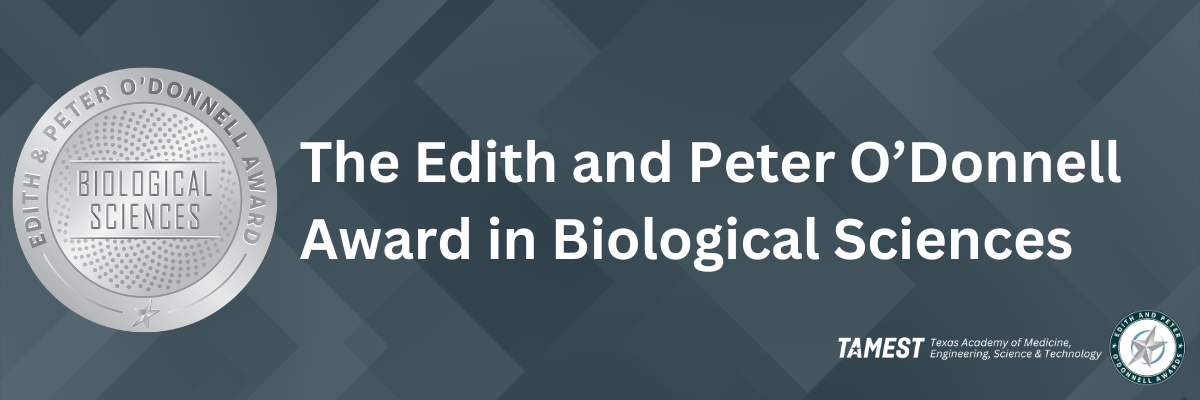
About the Edith and Peter O’Donnell Award in Biological Sciences
The Edith and Peter O’Donnell Award in Biological Sciences honors Texas researchers at academic institutions in biological and life sciences with a $25,000 honorarium, profile video and an invitation to present their research at the TAMEST Annual Conference.
Thanks to a $1.15 million gift from the O’Donnell Foundation in 2022, the O’Donnell Awards were expanded to include an additional science award so that awards could be given each year in both Biological and Physical Sciences categories. Previously, the science award alternated between biological sciences and physical sciences annually.
Most Recent Biological Sciences Recipient

Crucial cellular events rely on precise communication between proteins and RNAs. Dr. Nam’s lab is uncovering the molecular rules that govern this specificity. Her group elucidated how tiny regulatory molecules called microRNAs are selected and processed in cells, a step critical for switching specific genes “on” or “off.” Her discoveries further revealed that a molecule called heme – more commonly known for carrying oxygen in red blood cells – fine-tunes the fidelity of the Microprocessor complex, a protein machine central to microRNA biogenesis.
The Nam lab also investigates how chemical modifications such as RNA methylation can alter an RNA’s fate and reshape cellular programming. They showed how each of several RNA modification enzymes uses a distinct strategy to recognize its target. Deciphering these rules led Dr. Nam’s group to uncover a novel mechanism linking dysregulated RNA methylation to cancer.
Her innovative approach uses cutting-edge biochemistry and structural biology methods, including cryo-electron microscopy, to visualize molecular interactions. Her ability to combine the chemical findings with cellular studies and machine learning enables the group to uncover how each RNA-protein event is interpreted as a signal inside cells. This work not only deepens fundamental understanding of RNA biology but also creates new opportunities for diagnosing and treating disease, especially cancers driven by misregulated RNA pathways.
Past Biological Sciences Recipients
Ilya J. Finkelstein, Ph.D., The University of Texas at Austin | 2025
For improving the safety and efficacy of gene editing and understanding the mechanisms of DNA repair to potentially cure diseases.
Learn More >
Watch Dr. Finkelstein’s Award Acceptance >
Vincent Tagliabracci, Ph.D., UT Southwestern Medical Center | 2024
For his potentially life-saving research in understanding how enzymes work.
Learn More >
James J. Collins III, Ph.D., UT Southwestern Medical Center | 2023
For widening the understanding of schistosomiasis, a disease caused by parasitic worms that infect hundreds of millions of the world’s poorest and most vulnerable people, including children.
Learn More >
Benjamin Tu, Ph.D., UT Southwestern Medical Center | 2021
For his pioneering research on cellular roles of small molecule metabolites that may have relevance for cancer treatments and other diseases.
Learn More >
Julie Pfeiffer, Ph.D., UT Southwestern Medical Center | 2019
For re-defining how we think about life-threatening viral infections. She has discovered new ways that bacteria in the body can affect whether or not we get sick from viruses.
Learn More >
Watch Dr. Pfeiffer’s Award Acceptance >
Daniel I. Bolnick, Ph.D., The University of Texas at Austin | 2017
For his understanding on how some fish are resistant to parasites. With this understanding we can achieve a better understanding of our own immune systems, which could lead to better treatments for everything from allergies to Crohn’s Disease.
Learn More >
Watch Dr. Bolnick’s Award Acceptance >
Yuh Min Chook, Ph.D., UT Southwestern Medical Center | 2015
For work that explained the mechanism of ALS-disease mutations, permitted the design and revealed mechanisms of new anti-cancer drugs.
Learn More >
Watch Dr. Chook’s Award Acceptance >
Youxing Jiang, Ph.D., UT Southwestern Medical Center | 2013
For the elucidation of the atomic structures of membrane-bound ion channels.
Learn More >
Watch Dr. Jiang’s Award Acceptance >
Kim Orth, Ph.D. (NAS), UT Southwestern Medical Center | 2011
For the discovery of new intracellular signaling mechanisms and post-translational protein modifications usurped by bacterial pathogens and used during infection of mammalian cells.
National Academy of Sciences: 2020
Learn More >
Rama Ranganathan, Ph.D., UT Southwestern Medical Center | 2009
For developing an approach for understanding the evolutionary design of protein structure and function.
Learn More >
Zhijian “James” Chen, Ph.D. (NAM, NAS, FRS), UT Southwestern Medical Center | 2007
For his discovery of the novel role of ubiquitin in regulating protein kinases and other biological activities, and the discovery of a new role of mitochondria in immune responses.
National Academy of Sciences: 2014
National Academy of Medicine: 2022
Royal Society Fellow: 2025
Learn More >
Michael Rosen, Ph.D. (NAS), UT Southwestern Medical Center | 2006
For researching how cells maintain their shape as they move through the body, which could have implications in development of drugs that alter the behavior of abnormal cells.
National Academy of Sciences: 2020
Learn More >

